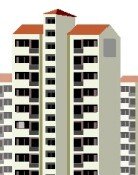The Walls Were High for Real Economic Reform
The Walls Were High for Real Economic Reform
Posted December. 29, 2003 22:51,
Lee Jung-woo, chief secretary to the president for national policy, who has lost the most influence over the current governments economic policies, is now catching the spotlight again over the rosy ideal that the successive first economical policy makers had dreamed of and the grim reality after his fall back.
Since the Kim Young-sam government, the first economic policy leaders who assisted the president were scholars, and they all advocated reform but handed over their positions to economic bureaucrats without leaving distinct accomplishments.
From this, it has been pointed out that the presidents overabundant enthusiasm at the beginning of his inauguration and the absence of a personnel system is being repeated.
▽ A repeating history
Former president Kim Young-sam had appointed Park Jae-yoon, an economics professor at Seoul National University, as presidential secretary of economy, in February of 1993. Park was known as YSs private tutor for economics, and had participated in the campaigning during former president Kims candidate years.
Park set out a 100 Day Plan for a New Economy slogan right after being appointed. The details included freezing the payroll of government employees and the price of manufactured goods and supporting the manufacturing industry with money cut from the budget as the financial resource.
But the freezing was no different from the price stability plan the fifth republic had induced, and was far from market logic. It also created conflicts with the economic bureaucrats. Former Secretary Park, who had been commented to control the economic field in the early stage of the YS government, and had dreamed of being the deputy prime minister of economy, had ended his tour after being transferred to minister of the Ministry of Trade, Industry and Energy in 1994, when globalization had become the new topic. Parks position, as an economic planner, was given to Hahn Lee-hun, an old-handed economic bureaucrat.
Kim Tae-dong, a professor at Sung Kyun Kwan University, was appointed as presidential secretary of economy in the Kim Dae-jung government. Professor Kim was the leading character of Joong Kyeong Hwoi, Kims economic consulting group, which was no different from the planning room for DJ-nomics, and valued distribution more than growth.
He, with other members of the Joong Kyeong Hwoi, including Financial Supervisory Commission Vice Chairman Yoon Won-bae and Korea Development Institute (KDI) Director Lee Jin-soon, secured the key positions in the economic field and afterward called for economic reforms.
With the intense attack on big corporations and economic bureaucrats, and trouble with the bureaucracy overlapped, and he was pushed out to presidential secretary for policy planning in just three months. The other Joong Kyeong Hwoi members resigned their positions after 1999.
Former chief secretary for national policy Lee Jung-woo also had an academic origin. Government employees in the economic department judged that he showed less self-righteousness and arbitrary decision-making, compared with Park Jae-yoon and Kim Tae-dong. But he could not show a definite vision and his sense of reality failed. The balancing between the departments was unsatisfactory, and he eventually resigned from presidential economic staff.
▽ High ideals, grim reality
Economic experts pointed out that those with noble ideals who could not look straight at the grim reality, paradoxically speaking, had brought a standstill or recession to the Korean economy.
Park Jae-yoon openly declared a current account surplus and three percent price stability after 1995, but brought an accumulated current account deficit and price insecurity. There is analysis indicating that this along with the disappearance of the reform of the economic structure had consequently brought about the foreign exchange crisis.
The general analysis of the distribution theory that Kim Tae-dong and Lee Jung-woo had stressed found that when growing the economy was the pressing need, it brought more losses than gains.
Korea Economic Research Institute President Jwa Sung-hee commented, They are romantic idealists who couldnt face up to the grim reality.
Samsung Economic Research Institute Managing Director Chang Sang-soo said, It may have worked in 1960, but as the economic structure becomes advanced and complicated, applying the textbook ideals to reality is unreasonable.
Ki-Jeong Ko koh@donga.com
Headline News
- Joint investigation headquarters asks Yoon to appear at the investigation office
- KDIC colonel: Cable ties and hoods to control NEC staff were prepared
- Results of real estate development diverged by accessibility to Gangnam
- New budget proposal reflecting Trump’s demand rejected
- Son Heung-min scores winning corner kick







